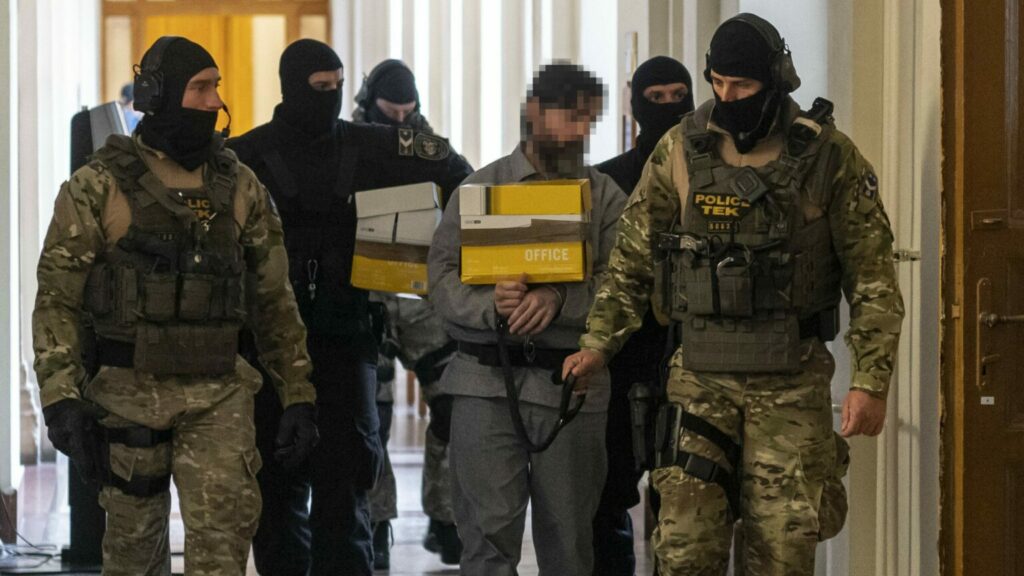The https://english.atlatszo.hu use cookies to track and profile customers such as action tags and pixel tracking on our website to assist our marketing. On our website we use technical, analytical, marketing and preference cookies. These are necessary for our site to work properly and to give us inforamation about how our site is used. See Cookies Policy
We take the case of the interrupted and then prohibited prison interview to Strasbourg
Átlátszó is appealing to the European Court of Human Rights because the Hungarian Prison Services (BvOP) first interrupted and then refused to continue our interview with Tamás Portik, who is serving his prison sentence, and also forbade the publication of the truncated version that we completed before the interruption. According to our lawyer, the interruption was an arbitrary and unjustified restriction of press freedom. However, we have no legal remedy in Hungary. We would have liked to have spoken to Sándor Pintér on the matter, but the Interior Minister refused to take up the opportunity.
On 31 July, we were to interview Tamás Portik with the permission of the prison authorities. We planned to ask Portik, who has been in prison since 2012 for the underworld bombings and murders of the 1990s, about the book written about him. Portik started to answer the questions, however, the interview was interrupted for technical reasons, and despite our request, we were not allowed to continue or to publish truncated version that we completed before the interruption.
The case has attracted a lot of attention, with several media outlets covering Átlátszó’s stories on the subject. In addition, Zoltán Vajda, opposition MP, asked the Prosecutor General’s Office, which oversees the legality of the Hungarian Prison Services (BVOP), to investigate the case. However, the Prosecutor General’s Office’s response only added to the question marks and doubts, so we are seeking legal remedy at the international level.

In its reply, the Prosecutor General’s Office wrote that “Based on the available data, the prisoner’s statement was interrupted on 31 July 2023 at BVOP due to a technical reason (the image and sound were faulty). Interruption for such a reason is a technical matter, and the procedure of the penitentiary organisation is not regulated by law”.
The prosecutor’s office also said in a more detailed response to the Átlátszó reporter that “the interview was interrupted due to a technical reason (the image and sound error) on the part of the detainee”.
However, this “technical reason” is factually untrue, since the Skype video connection was excellent. It is therefore difficult to believe that there was any technical error that would have made it impossible to continue the interview.
Our request to continue the interview was treated as a new and separate request.
On August 4, we were informed that our request for the interview’s continuation had been declined.
It is strange enough that the interruption is justified by a seemingly non-existent technical fault, while the refusal to proceed was based on reasons of content. BVOP received our questions on 28 July, forwarded them to Tamás Portik, and at that time they had no problem with the interview, which started three days later.
Questions about Sándor Pintér raised the possibility that there was a political or politically motivated reason for interrupting the interview and forbidding its continuation or publication. The Ministry of the Interior was contacted several times and the Minister of the Interior was asked for an interview, to which the Ministry’s Communications Department replied:
“We inform you that the Minister of Interior, Dr. Sándor Pintér, does not wish to make use of the opportunity of an interview.”
As there seems to be no hope for clarification, explanation, or legal remedy at the domestic level, Átlátszó and the journalist interviewed decided to appeal to the European Court of Human Rights.
“We are taking the case directly to the European Court of Human Rights in Strasbourg, as we believe that the interruption of the interview was an arbitrary and unjustified restriction on freedom of expression and freedom of the press, and the lack of legal remedy also violates the rights recognised in the European Convention on Human Rights in relation to access to justice,” said Tibor Sepsi, the lawyer of Átlátszó.
Translated by Zita Szopkó. The original, Hungarian version of this story was written by Tamás László Papp and can be found here.
Share:
Your support matters. Your donation helps us to uncover the truth.
- PayPal
- Bank transfer
- Patreon
- Benevity
Support our work with a PayPal donation to the Átlátszónet Foundation! Thank you.
Support our work by bank transfer to the account of the Átlátszónet Foundation. Please add in the comments: “Donation”
Beneficiary: Átlátszónet Alapítvány, bank name and address: Raiffeisen Bank, H-1054 Budapest, Akadémia utca 6.
EUR: IBAN HU36 1201 1265 0142 5189 0040 0002
USD: IBAN HU36 1201 1265 0142 5189 0050 0009
HUF: IBAN HU78 1201 1265 0142 5189 0030 0005
SWIFT: UBRTHUHB
Be a follower on Patreon
Support us on Benevity!

